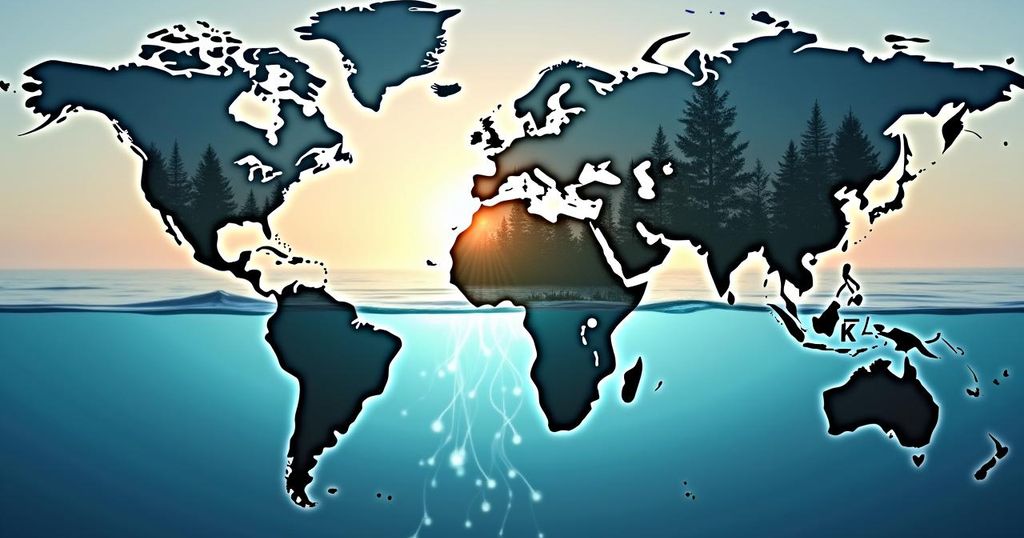The United Nations has warned that climate change is making the water cycle increasingly erratic, resulting in more frequent and severe floods and droughts. The WMO reported record lows in river levels, significant glacier melt, and rising numbers of people lacking access to fresh water. Immediate actions, including better monitoring and infrastructure investments, are needed to manage these escalating water-related crises.
The United Nations has issued a grave warning regarding the growing unpredictability of the planet’s water cycle, attributing the increasingly intense occurrences of floods and droughts to climate change. According to the UN’s World Meteorological Organization (WMO), the year prior witnessed some of the driest conditions for rivers globally in over three decades, along with a record loss of glacier ice and numerous significant flooding events. Celeste Saulo, Secretary-General of the WMO, articulated that, “Water is the canary in the coalmine of climate change.” She emphasized that the manifestations of climate change are evident through the extremes in rainfall patterns, resulting in devastating impacts on human lives, ecosystems, and economies worldwide. Climate alterations have rendered the water cycle more erratic, as last year marked the hottest on record, with prolonged periods of drought and significant flooding around the globe. While natural climate phenomena, such as La Nina and El Nino, play a role in these extreme weather patterns, human-induced climate change is increasingly significant. Saulo noted, “A warmer atmosphere holds more moisture, which is conducive to heavy rainfall. More rapid evaporation and drying of soils worsen drought conditions.” Regions worldwide are grappling with these severe fluctuations in water availability. Africa has been particularly hard hit, facing the greatest number of casualties due to flooding and water scarcity. One catastrophic incident in Libya resulted in the collapse of two dams, claiming over 11,000 lives. Additionally, the Greater Horn of Africa, the Democratic Republic of Congo, Rwanda, Mozambique, and Malawi have also felt the repercussions of these extreme events. Currently, approximately 3.6 billion people lack adequate access to fresh water at least once a month, with projections suggesting this figure will exceed five billion by 2050. Over the past several years, more than half of the river catchment areas have experienced drier-than-usual conditions, and the inflow to reservoirs has remained below normal in numerous regions. The accelerating melting of glaciers has resulted in the loss of over 600 billion tonnes of water, the most significant observed reduction in half a century. Saulo cautioned that such trends threaten long-term water security for millions, stating, “And yet we are not taking the necessary urgent action.” The WMO has called for enhanced monitoring of freshwater resources and the establishment of early warning systems to alleviate the impacts on living beings and wildlife. Saulo stressed, “We cannot manage what we do not measure.” In addition to advocating for reduced greenhouse gas emissions, Stefan Uhlenbrook, Director of the WMO’s hydrology, water, and cryosphere department, urged investments in water preservation infrastructure and highlighted the necessity of conserving water, particularly for agricultural uses. He acknowledged that returning to a more stable natural water cycle would be profoundly challenging, asserting, “The only thing we can do is to stabilize the climate, which is a generational challenge.”
The discussion surrounding the unpredictability of the water cycle is rooted in the broader context of climate change and its impacts on environmental patterns. As the planet’s temperature rises due to human activities, various climate phenomena become more prevalent, leading to erratic weather events. The alarming trends highlighted by the UN emphasize the worsening conditions of freshwater availability, highlighting how climate change is contributing to an increasingly volatile environment. Understanding the implications of this disruption in the water cycle is crucial for planning and managing water resources effectively.
The United Nations’ warning on the erratic nature of the world’s water cycle underscores a critical climate crisis exacerbated by human activities. The report from the World Meteorological Organization outlines alarming trends, including unprecedented droughts and floods that threaten the lives of billions and strain water resources globally. Urgent action is required to stabilize the climate, improve management of freshwater resources, and invest in sustainable practices to mitigate future disasters and safeguard the planet’s water security.
Original Source: www.france24.com







